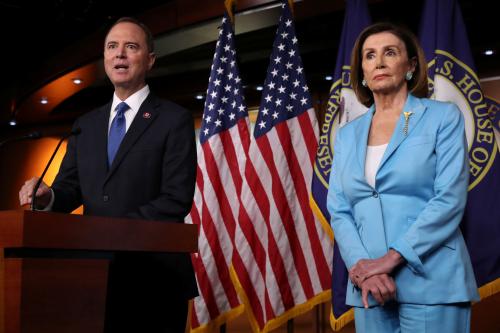Memo to Democrats: unless Special Counsel Robert Mueller’s investigation delivers a smoking gun, don’t rush to impeach President Trump.
This is the main takeaway from the Harvard/Politico survey released today.
Of 21 possible priorities for the new Congress, impeaching the president was tied for last, with only 38 percent of Americans deeming it “extremely important.” Republicans are united against it; no surprise there. But tellingly, it receives less support among Independents than does any other option, and Democrats rank it only 14th on their priority list.
This poll is anything but an outlier. Exit polls from the midterm elections found 41 percent of voters in favor of impeachment, with 57 percent opposed. Support among Independent voters stood at 34 percent. A Monmouth survey released on November 14 showed 36 percent in favor, 59 percent opposed, with Independents splitting 26-67 and moderates 42-52. A month later, CNN found 42 percent of registered voters in favor of impeachment, 51 percent opposed. Only 36 percent of Independents and 44 percent of moderates supported this move.
Political history also counsels caution. If you strike at the king, you must slay him, runs an ancient aphorism. Republicans found this out the hard way in the 1998 midterm election, when their focus on Bill Clinton’s misdeeds yielded such disappointing results that House Speaker Newt Gingrich felt compelled to resign. In the ensuing impeachment struggle, a narrow, partisan Republican majority in the House ran into a stone wall in the Senate, where numerous members of their own party voted to acquit the president.
In 1974, by contrast, Democrats held their fire—and Republicans continued to support Richard Nixon– until the release of the Oval Office tapes revealed the smoking gun. Within days, Republican support for President Nixon withered. Faced with certain conviction in the Senate, the president chose to resign, to the relief of a large majority of the people.
There is, finally, an argument based on the long-term public interest. In the absence of far more public consensus than now exists, removing Mr. Trump from the presidency through impeachment would enrage and embitter his hard-core supporters—about one-third of the country. A deep state, state-in-the-back conspiracy theory would take root, and his successor would endure the taint of illegitimacy.
Only a clear and present threat to our basic institutions could justify such a risky step. Relying on the normal electoral process would be a safer course—unless those who want to force Mr. Trump from office before January of 2021 have lost faith in the common sense of the American people.
The Brookings Institution is committed to quality, independence, and impact.
We are supported by a diverse array of funders. In line with our values and policies, each Brookings publication represents the sole views of its author(s).











Commentary
Impeachment is not a high priority for voters, recent polls show
January 3, 2019